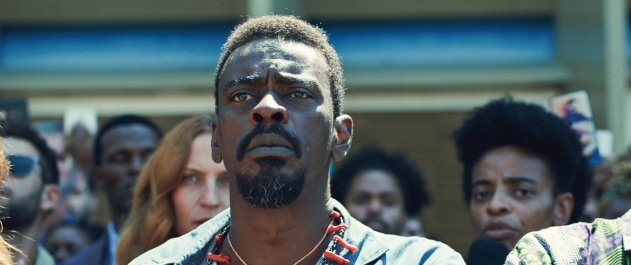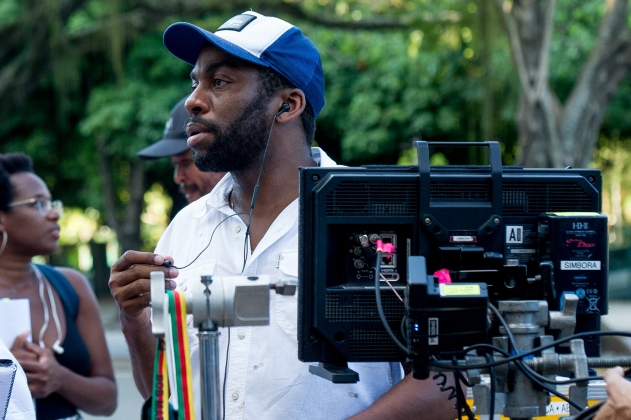-and-Alfred-Enoch-Photo-Courtesy-of-Elo-Company-min.jpg)
Set in near future Rio de Janeiro, the new political thriller EXECUTIVE ORDER stars Alfred Enoch (HARRY POTTER) as a lawyer helping to stage a rebellion against the authoritarian regime trying to force all Black citizens out of the country, to Africa. EXECUTIVE ORDER, which deals with subjects such as racism, inequality, and power, is playing in SXSW in the Spotlight section. In addition to Enoch, the film stars the popular Brazilian actress Taís Araujo (ARUANAS) and the acclaimed singer and actor Seu Jorge (THE LIFE ACQUATIC). EXECUTIVE ORDER is the directorial debut of actor Lázaro Ramos (BEIJO NO ASFALTO). We spoke with Ramos from his home in Brazil.
Science & Film: Skin color becomes a method of surveillance and control in EXECUTIVE ORDER. Why did you choose to use the term melanized to distinguish people?
Lázaro Ramos: This movie is based on a play which we opened in 2011 and this term—high melanin—came from the play, but it’s because here in Brazil the discussion about affirmative politics is huge. One of the characteristics of this discussion is that some people ask, how is it possible to tell who is Black or not in Brazil? When we were rehearsing the play, we decided to think about what the future of this discussion could look like. We thought, people will talk about how dark the skin is. Maybe there will be something genetic, and some kind of machine which can discover how high the melanin of a person is.
For this movie, we did a lot of research thinking about the future. We had two scripts: one with the lines and one with a study of each scene with its inspirations—poetry, a fight from Facebook… It’s an alert to think of things that we don’t want to happen. Unfortunately, this movie depicts many things that have happened already. We shot it in 2019 and one of the deaths in the movie [happens in] the same [way] as George Floyd[‘s murder].
,-and-Alfred-Enoch-Photo-by-Mariana-Vianna-Photo-Courtesy-of-Elo-Company-min.jpg)
Taís Araúj and Alfred Enoch, Photo by Mariana Vianna, Courtesy of Elo Company
S&F: Can you tell me a little more about using the two scripts?
LR: It’s a technique that we invented. I am an actor, this is my first movie, but I’ve directed many plays and I have a kind of language that I really like to use. The movie is a comedy, thriller, and drama. Those two scripts were very important because one was for inspiration. I used it and all the crew used it too; it was a technique to inspire my crew. I think it’s kind of bourgeois when someone says, “a movie by someone.” I want everyone to feel the movie is theirs.
S&F: Do you imagine this film as a call to action?
LR: We had many options for how to tell this story. I really want everyone to watch this movie and think about how to change these situations. I want people to stand up and act. That’s why I began this movie with a comment because it’s welcoming, and I want people to be a part of this movie. I don’t know what will happen exactly but I’m dreaming of watching this movie with a huge audience in the cinema and discussing its subjects.
S&F: How did you decide how to depict the future in EXECUTIVE ORDER?
LR: We shot the movie with many futuristic elements, but if you think about it we have been talking about these same subjects for many years. The play WAITING FOR GODOT is talking about exactly the same subjects. We thought, it doesn’t matter if we have futuristic spaceships and different clothes; the subject is the king of this movie. It’s a subject we’ve been discussing for many years and that’s what’s interesting, how we avoid many subjects: identity, racism, prejudice. We have been talking about our masks since many years ago. Now we are talking about them again. That is something to think about.

Seu Jorge, Photo by Mariana Vianna, Courtesy of Elo Company
S&F: Your film reminded me a little bit of BACURAU, which also is set in the future but it’s a future that looks very much like the past—somewhat similar to your film and maybe intentional because as you’re saying, these are not new subjects.
LR: You know, my movie started in 2012 and that was the same time when [the filmmakers of] BACURAU started thinking about those subjects. I think it’s a kind of signal that our social and political history are speaking to artists and there is something to think about. This is a coincidence, but it says something. For me, it begs the question, what is the solution?

Lázaro Ramos, Courtesy of Lata Filmes
It was very difficult for me to decide what the end of the movie would be. I shot three endings in fact. I shot one when five years had passed, and we saw the next future in Brazil. I shot one poetic ending when the characters are on the beach and it starts to snow. I decided to use the final scene I used [of a protest] because I wanted to put the audience in a place where they felt strong and empowered to change. I want them to walk with us in this final march. It’s not a simple solution: there is something philosophical and symbolic in that, but it’s possible.
♦
EXECUTIVE ORDER is directed by Lázaro Ramos, and co-written by Ramos and Lusa Silvestre. It is produced by Daniel Filho and Tania Rocha, edited by Diana Vasconcellos, with music by Plinio Profeta, Rincon Sapiência, and Kiko de Souza. The film stars Alfred Enoch, Taís Araújo, Seu Jorge, Adriana Esteves, Renata Sorrah, and Willian Russel Enoch. The film plays for U.S. audiences online as part of SXSW, which runs March 16-20.
TOPICS